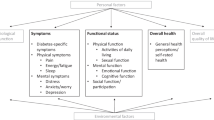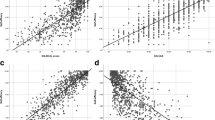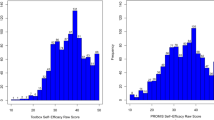Abstract
Objectives
To provide an in-depth analysis of outcome measures used in the evaluation of chronic disease self-management programs consistent with the Stanford curricula.
Methods
Based on a systematic review on self-management programs, effect sizes derived from reported outcome measures are categorized according to the quality of life appraisal model developed by Schwartz and Rapkin which classifies outcomes from performance-based measures (e.g., clinical outcomes) to evaluation-based measures (e.g., emotional well-being).
Results
The majority of outcomes assessed in self-management trials are based on evaluation-based methods. Overall, effects on knowledge—the only performance-based measure observed in selected trials—are generally medium to large. In contrast, substantially more inconsistent results are found for both perception- and evaluation-based measures that mostly range between nil and small positive effects.
Conclusions
Effectiveness of self-management interventions and resulting recommendations for health policy makers are most frequently derived from highly variable evaluation-based measures, that is, types of outcomes that potentially carry a substantial amount of measurement error and/or bias such as response shift. Therefore, decisions regarding the value and efficacy of chronic disease self-management programs need to be interpreted with care. More research, especially qualitative studies, is needed to unravel cognitive processes and the role of response shift bias in the measurement of change.

Similar content being viewed by others
References
Wagner, E., Davis, C., Schaefer, J., Von Korff, M., & Austin, B. (1999). A survey of leading chronic disease management programs: Are they consistent with the literature? Managed Care Quarterly, 7(3), 56–66.
World Health Organization. (2002). Innovative care for chronic conditions: building blocks for action. Geneva: World Health Organization.
Newman, S., Steed, L., & Mulligan, K. (2004). Self-management interventions for chronic illness. Lancet, 364(9444), 1523–1537.
Barlow, J., Wright, C., Sheasby, J., Turner, A., & Hainsworth, J. (2002). Self-management approaches for people with chronic conditions: a review. Patient Education and Counseling, 48(2), 177–187.
Lorig, K. R., González, V. M., & Laurent, D. D. (1999). The chronic disease self-management program: Leaders manual. Palo Alto: Stanford University.
Lorig, K. R. (2003). Editorial—self-management education: More than a nice extra. Medical Care, 41(6), 699–701.
Chodosh, J., Morton, S. C., Mojica, W., Maglione, M., Suttorp, M. J., Hilton, L., et al. (2005). Meta-analysis: chronic disease self-management programs for older adults. Annals of Internal Medicine, 143(6), 427–438.
Warsi, A., Wang, P. S., LaValley, M. P., Avorn, J., & Solomon, D. H. (2004). Self-management education programs in chronic disease: A systematic review and methodological critique of the literature. Archives of Internal Medicine, 164(15), 1641–1649.
Astin, J. A., Beckner, W., Soeken, K., Hochberg, M. C., & Berman, B. (2002). Psychological interventions for rheumatoid arthritis: A meta-analysis of randomized controlled trials. Arthritis and Rheumatism, 47(3), 291–302.
Devos-Comby, L., Cronan, T., & Roesch, S. C. (2006). Do exercise and self-management interventions benefit patients with osteoarthritis of the knee? A metaanalytic review. The Journal of Rheumatology, 33(4), 744–756.
Warsi, A., LaValley, M. P., Wang, P. S., Avorn, J., & Solomon, D. H. (2003). Arthritis self-management education programs: A meta-analysis of the effect on pain and disability. Arthritis and Rheumatism, 48(8), 2207–2213.
March, L., Amatya, B., Osborne, R., & Brand, C. (2010). Developing a minimum standard of care for treating people with osteoarthritis of the hip and knee. Best Practice & Research Clinical rheumatology, 24(1), 121–145.
Schwartz, C. E., & Rapkin, B. D. (2004). Reconsidering the psychometrics of quality of life assessment in light of response shift and appraisal. Health Qual Life Outcomes Retrieved April 15, 2006, from http://www.hqlo.com/content/2/1/16.
Schwarz, N., & Strack, F. (1985). Cognitive and affective processes in judgements of subjective well-being: A preliminary model. In H. Brandstatter & E. Kirchler (Eds.), Economic psychology (pp. 439–447). Linz, Austria: R. Tauner.
Tourangeau, R., & Rasinski, K. (1988). Cognitive processes underlying context effects in attitude measurement. Psychological Bulletin, 103, 299–314.
Krosnick, J. A. (1999). Survey research. Annual Review of Psychology, 50, 537–567.
Crowne, D. P., & Marlowe, D. (1964). The approval motive: Studies in evaluative dependence. New York, London, Sydney: Wiley.
Sprangers, M. A. G., & Schwartz, C. E. (1999). Integrating response shift into health-related quality of life research: A theoretical model. Social Science and Medicine, 48(11), 1507–1515.
Schwartz, C. E., & Sprangers, M. A. G. (1999). Methodological approaches for assessing response shift in longitudinal health-related quality-of-life research. Social Science and Medicine, 48(11), 1531–1548.
Nolte, S., & Osborne, R. H. (2012). A systematic review of outcomes of chronic disease self-management interventions. Quality of Life Research [Epub ahead of print 2012 Oct 31].
Lorig, K., Lubeck, D., Kraines, R. G., Seleznick, M., & Holman, H. R. (1985). Outcomes of self-help education for patients with arthritis. Arthritis and Rheumatism, 28(6), 680–685.
Cohen, J. (1988). Statistical power analysis for the behavioural sciences (2nd ed.). Hillsdale, NJ: Lawrence Erlbaum Associates.
Heuts, P. H. T. G., de Bie, R., Drietelaar, M., Aretz, K., Hopman-Rock, M., Bastiaenen, C. H. G., et al. (2005). Self-management in osteoarthritis of hip or knee: A randomized clinical trial in a primary healthcare setting. The Journal of Rheumatology, 32(3), 543–549.
Hopman-Rock, M., & Westhoff, M. H. (2000). The effects of a health educational and exercise program for older adults with osteoarthritis of the hip or knee. The Journal of Rheumatology, 27(8), 1947–1954.
Keefe, F. J., Caldwell, D. S., Wiliams, D. A., Gil, K. M., Mitchell, D., Robertson, C., et al. (1990). Pain coping skills training in the management of osteoarthritic knee pain: A comparative study. Behavior Therapy, 21, 49–62.
Barlow, J. H., Turner, A. P., & Wright, C. C. (2000). A randomized controlled study of the Arthritis self-management programme in the UK. Health Education Research, 15(6), 665–680.
Lorig, K., Feigenbaum, P., Regan, C., Ung, E., Chastain, R. L., & Holman, H. R. (1986). A comparison of lay-taught and professional-taught arthritis self-management courses. Journal of Rheumatology, 13(4), 763–767.
Lorig, K., González, V. M., & Ritter, P. (1999). Community-based Spanish language arthritis education program: A randomized trial. Medical Care, 37(9), 957–963.
Lorig, K., Seleznick, M., Lubeck, D., Ung, E., Chastain, R. L., & Holman, H. R. (1989). The beneficial outcomes of the arthritis self-management course are not adequately explained by behavior change. Arthritis and Rheumatism, 32(1), 91–95.
Goeppinger, J., Arthur, M. W., Baglioni, A. J., Jr, Brunk, S. E., & Brunner, C. M. (1989). A reexamination of the effectiveness of self-care education for persons with arthritis. Arthritis and Rheumatism, 32(6), 706–716.
Scholten, C., Brodowicz, T., Graninger, W., Gardavsky, I., Pils, K., Pesau, B., et al. (1999). Persistent functional and social benefit 5 years after a multidisciplinary arthritis training program. Archives of Physical Medicine and Rehabilitation, 80, 1282–1287.
Taal, E., Riemsma, R. P., Brus, H. L., Seydel, E. R., Rasker, J. J., & Wiegman, O. (1993). Group education for patients with rheumatoid arthritis. Patient Education and Counseling, 20(2–3), 177–187.
Haas, M., Groupp, E., Muench, J., Kraemer, D., Brummel-Smith, K., Sharma, R., et al. (2005). Chronic disease self-management program for low back pain in the elderly. Journal of Manipulative and Physiological Therapeutics, 28(4), 228–237.
Von Korff, M., Moore, J. E., Lorig, K., Cherkin, D. C., Saunders, K., González, V. M., et al. (1998). A randomized trial of a lay person-led self-management group intervention for back pain patients in primary care. Spine, 23(23), 2608–2615.
LeFort, S. M., Gray-Donald, K., Rowat, K. M., & Jeans, M. E. (1998). Randomized controlled trial of a community-based psychoeducation program for the self-management of chronic pain. Pain, 74(2–3), 297–306.
Burckhardt, C. S., Mannerkorpi, K., Hedenberg, L., & Bjelle, A. (1994). A randomized, controlled clinical trial of education and physical training for women with fibromyalgia. Journal of Rheumatology, 21, 714–720.
Fu, D., Fu, H., McGowan, P., Shen, Y.-E., Zhu, L., Yang, H., et al. (2003). Implementation and quantitative evaluation of chronic disease self-management programme in Shanghai, China: Randomized controlled trial. Bulletin of the World Health Organization, 81(3), 174–182.
Griffiths, C., Motlib, J., Azad, A., Ramsay, J., Eldridge, S., Feder, G., et al. (2005). Randomised controlled trial of a lay-led self-management programme for Bangladeshi patients with chronic disease. British Journal of General Practice, 55, 831–837.
Lorig, K. R., Ritter, P. L., & González, V. M. (2003). Hispanic chronic disease self-management—a randomized community-based outcome trial. Nursing Research, 52(6), 361–369.
Lorig, K. R., Sobel, D. S., Stewart, A. L., Brown, B. W., Bandura, A., Ritter, P., et al. (1999). Evidence suggesting that a chronic disease self-management program can improve health status while reducing hospitalization. Medical Care, 37(1), 5–14.
Gibbons, F. X. (1999). Social comparison as a mediator of response shift. Social Science and Medicine, 48(11), 1517–1530.
Prochaska, J. O., Redding, C. A., & Evers, K. E. (2008). The transtheoretical model and stages of change. In K. Glanz, F. M. Lewis, & B. K. Rimer (Eds.), Health behavior and health education: Theory, research, and practice (4th ed., pp. 97–122). San Francisco: Wiley.
Buunk, B., Gibbons, F., & Visser, A. (2002). The relevance of social comparison processes for prevention and health care. Patient Education and Counseling, 47, 1–3.
Osborne, R. H., Batterham, R., & Livingston, J. (2011). The evaluation of chronic disease self-management support across settings: The international experience of the health education impact questionnaire monitoring system. Nursing Clinics of North America, 46(3), 255–270.
Brady, T. (1997). Do common arthritis self-efficacy measures really measure self-efficacy? Arthritis Care and Research, 10(1), 1–8.
Osborne, R. H., Elsworth, G. R., & Whitfield, K. (2007). The health education impact questionnaire (heiQ): An outcomes and evaluation measure for patient education and self-management interventions for people with chronic conditions. Patient Education and Counseling, 66, 192–201.
Author information
Authors and Affiliations
Corresponding author
Rights and permissions
About this article
Cite this article
Nolte, S., Elsworth, G.R., Newman, S. et al. Measurement issues in the evaluation of chronic disease self-management programs. Qual Life Res 22, 1655–1664 (2013). https://doi.org/10.1007/s11136-012-0317-1
Accepted:
Published:
Issue Date:
DOI: https://doi.org/10.1007/s11136-012-0317-1




